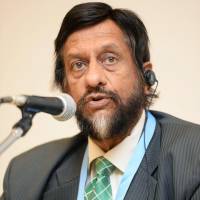Rajendra Pachauri, chairman of the U.N.-sponsored Intergovernmental Panel on Climate Change, stressed Wednesday that the impacts of global warming will be severe if the world fails to take action.
While admitting in an interview with Japanese reporters that to achieve an international goal of keeping the rise in global temperature since pre-industrial times below an average of 2 C seems difficult, Rajendra said the cost not acting will be enormous.
"Of course, it's difficult," he said of the 2-degree target. "But if you don't stabilize the climate of this planet, then the impacts are going to be progressively more serious."
Pachauri is in Yokohama for a five-day meeting that started Tuesday to finalize Working Group II's contribution to its latest assessment report on climate change.
It is extremely likely that human influence has been the dominant cause of the observed warming since the mid-20th century, the IPCC said last September in Stockholm based on findings by its Working Group I.
"The cost of inaction is going to be substantially higher and certainly makes our life much more difficult," Pachauri said. "We will be able to say much more on that subject (the 2-degree target) after the Working Group III report is released next month."
The IPCC's fifth assessment report will be composed of three working group reports and a synthesis report. The IPCC is scheduled to release the Working Group III part next month in Berlin and the synthesis report in October in Copenhagen.
In commenting on the deadly typhoon in the Philippines last November, Pachauri also said the world has to do something to stop a sea-level rise.
"If you don't do anything, then by the end of this century, you get to see the sea-level rise come up to 0.98 meter, and that's almost a meter," Pachauri said.
"You look at the case of tsunami that you suffered in Japan (in 2011). Imagine if the sea level was 90 centimeters lower. The extent of damage would've been substantially lower," he said.
Pachauri, who is from India, has served as IPCC chairman since 2002.
He declined to comment on the Japanese government's move toward allowing nuclear power plants to restart despite the opposition stirred up by multiple meltdowns three years ago at the Fukushima No. 1 complex.
Pachauri, however, expressed hope that Japan will play a key role in the global issue of effective energy use, saying, "Japan has attained a very high level of energy efficiency, perhaps one of the first countries to bring about a substantial increase in energy efficiency."



